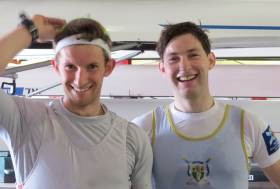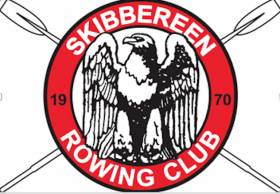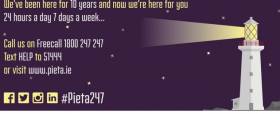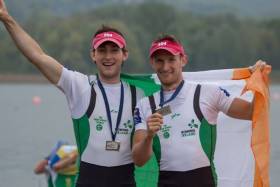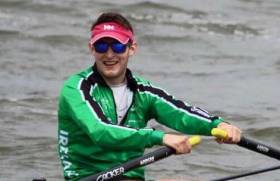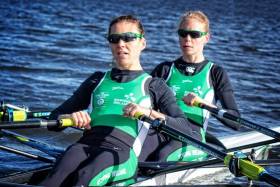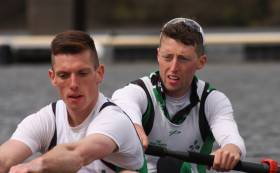Displaying items by tag: O'Donovan
Skibbereen and UCD Race in World-Class Quadruple at NRC
#Rowing: The men’s quadruple gave four top internationals the chance to show their speed at Skibbereen Regatta. Shane O’Driscoll, Paul O’Donovan, Gary O’Donovan and Mark O’Donovan won in a very good time of six minutes 29.9 seconds. NUIG’s two women’s coxed fours were also impressive – the B crew won well from the A crew in the Division One A Final. Two junior 16 competitors from Castleconnell, Norma Silke and Lauren O’Brien, zoomed away from the rest to win the Division Two double sculls, while Lee’s senior crew took the honours in the women’s quadruple. Enniskillen’s junior 18 crew won the Division One coxed four.
Skibbereen Grand League Regatta, National Rowing Centre, Day One (Selected Results; with Per Centage of Projected World Best Time)
Men
Eight – Division Two – A Final: 1 Queen’s (nov) 7:04.6. 3 Univ of Limerick (club two) 7:25.3, 6 Col Iognaid (jun 16) 7:40.6.
Four, coxed – Div One – A Final: 1 Enniskillen (jun 18A) 7:09.5 (82.18), 2 UCD (inter) 7:11.7 (81.78), 3 NUIG (sen) 7:12.9 (81.54). B Final: 2 NUIG (club one) 7:29.8 (78.48).
Pair – A Final: 1 Skibbereen (sen) 7:43.6 (80.46), 2 Commercial (sen) 7:50.8, 3 Enniskillen (jun 18A) 7:56.4; 4 Cork A (inter) 8:04.8 (76.95). C Final: 3 St Michael’s (club one) 8:10.1 (76.11).
Sculling,
Quadruple – Division One – A Final: 1 Skibbereen/UCD (sen) 6:29.9 (85.41), 2 Commercial (sen) 6:49.0 (81.42), 3 Shandon (jun 18A) 6:52.2 (80.79), 4 St Michael’s (club one) 7:11.0 (77.26).
Double – Div Two – A Final: 1 Castleconnell (jun 16) 8:51.7, 2 Shandon (club two) 9:17.3 (71.24). B Final: 2 Athlunkard (jun 18B) 9:57.4.
Single – A Final: 1 UCD (P O’Donovan; senior) 7:58.3 (81.78 per cent), 2 Skibbereen (G O’Donovan; sen) 8:03.4 (80.88), 3 UCD (A Goff; lightweight) 8:17.1 (78.66). B Final: 2 Skibbereen (K Mannix; intermediate) 8:21.6 (77.95); 5 Three Castles (R Quinn; jun 18A) 8:36.4 (75.71).
Women
Eight – Div Two – A Final: 1 Shandon (club two) 7:47.5; 4 NUIG (nov) 8:09.8. 5 Col Iognaid (jun 16) 8:12.8. Four, coxed – Division One – A Final: 1 NUIG B (inter) 8:03.5 (80.87), NUIG A (inter) 8:12.6 (79.37), 3 Cork (sen) 8:18.4 (78.45); 6 UCC (club one) 8:40.7 (75.9).
Pair – A Final: 1 UCC (sen) 8:39.8 (79.06), 2 Cork (inter) 8:40.5 (78.96), 3 Fermoy (jun 18A) 8:47.1 (77.97). B Final: 3 Belfast BC (club one) 9:14.9 (74.07); 6 Cork A (jun 18A) 9:35.7 (71.39)
Sculling
Quadruple – Div One – A Final: 1 Lee (sen) 7:35.2 (80.18), 2 Fermoy, Carlow, Skibbereen, Kenmare 7:36.6 (79.94), 3 Workmans (jun 18A) 7:48.1 (77.98).
Div Two, coxed – A Final: Cork (jun 18B) 8:34.6, 2 Lee A (club two) 8:47.4, 3 Carlow (jun 16), 4 Garda (club two) 9:00.0. B Final: 2 UCD A (nov) 9:21.4.
Double – Div Two – A Final: 1 Castleconnell (jun 16) 8:51.7, 2 Shandon (club two) 9:17.3. B Final: 2 Athlunkard (jun 18B) 9:57.4.
Single – A Final: 1 Old Collegians (S Puspure; sen) 8:33.5 (82.97), 2 Killorglin (M Dukarska; sen) 8:45.0 (81.14), 3 UCD (A Crowley; inter) 9:06.8 (77.91). B Final: 3 Col Iognaid (C Nic Dhonncha; jun 18A) 9:38.1 (73.69), 4 Lee Valley (E O’Mahony; club one) 9:45.6 (72.75).
Skibbereen Regatta Has Big Numbers and Homegrown Stars
#Rowing: Skibbereen Regatta on Friday and Saturday, April 8th and 9th, at the National Rowing Centre in Cork, is a huge event which gives spectators and athletes a chance to see medal winners from Olympic Games, World Championships – and the women’s Boat Race. Claire Lambe, a Boat Race winner last Sunday with Cambridge, teams up with double Olympian Sanita Puspure in a double scull.
Olympic medallists Paul and Gary O’Donovan will join Mark O’Donovan and Shane O’Driscoll in a four and in a quadruple.
Paul O’Donovan, the world champion in the lightweight single sculls, joins Gary in the draw for the Division One single sculls. The event, with an entry of almost 700, is the first in the three-event Grand League: Dublin Metropolitan (Metro) and Cork will follow on in May and June.
Top Rowers Pull Together for Pieta House
#Rowing: A group of Ireland’s top rowers are hosting a special charity event this Sunday. The Run to Row at the National Rowing Centre in Farran Woods park in Cork is being held to raise funds for Pieta House, the charity which deals with people have suicidal ideation or who self-harm. There are prizes for families and for individuals who take part. Irish internationals Shane O’Driscoll, Mark O’Donovan and Sanita Puspure are behind the drive. “It’s alarming to hear of young people taking their own lives,” Puspure said. “All the funds from Sunday will go to Pieta House. There is a real need there.”
Puspure Excels at Head of the Charles Rowing Regatta
#Rowing: Ireland’s Sanita Puspure had an impressive result at the Head of the Charles Regatta in Boston. The Old Collegians rower teamed up with Magdalena Lobnig of Austria to finish second in the Women’s Championship Doubles behind Kim Brennan, the world and Olympic single sculls champion, and Emma Twigg.
Paul and Gary O’Donovan finished eighth in the Men’s Championship Double.
Head of the Charles River, Boston (Irish interest; selected results)
Men
Championship Doubles: 8 P O’Donovan, G O’Donovan 17 min 39.742 seconds.
Women
Championships Doubles: 1 K Brennan, E Twigg 18:08.7, 2 M Lobnig, S Puspure 18:20.219.
O'Donovans to Compete in United States
#Rowing: Ireland’s silver medallists from Rio 2016, Paul and Gary O’Donovan, will compete at the Head of the Charles Regatta in Boston on October 22nd and 23rd. The brothers will compete in the Championship Doubles on the Saturday and may also team up to form a quadruple on the Sunday.
Ireland Olympian Sanita Puspure will team up with Magdalena Lobnig of Austria in the women’s Championship Double, and both will be part of a Great Eight on the Sunday.
O'Driscoll and O'Donovan Denied in World Rowing Final
#Rowing: Mark O'Donovan and Shane O'Driscoll finished fourth in the A Final of the lightweight men's pair at the World Rowing Championships in Rotterdam today. France won impressively, under pressure from Denmark in the closing stages, with the defending champions, Britain, having to settle for the bronze medal. O'Donovan and O'Driscoll finished out well, pushing hard to pressure Britain, but they held firm.
Holly Nixon from Enniskillen was part of the Britain's women's four which won gold.
World Rowing Championships, Rotterdam (Irish interest; selected results)
Men
Lightweight Pair - A Final: 1 France 7:14.18, 2 Denmark 7:15.30, 3 Britain (J Cassells, S Scrimgeour) 7:16.49; 4 Ireland (M O'Donovan, S O'Driscoll) 7:24.6, 5 China 7:32.48, 6 United States 7:36.91.
Lightweight Single Sculls - A Final: 1 Ireland (P O'Donovan) 7:32.84, 2 Hungary (P Galambos) 7:36.95, 3 Slovakia (L Babac) 7:38.89; 4 Slovenia (R Hrvat) 7:41.07, 5 Germany (K Steinhuebel) 7:48.66, 6 Serbia (M Stanojevic) 7:49.03.
Women
Four - A Final: 1 Britain (3 H Nixon) 7:16.28.
O'Donovan and Lightweight Pair Race Into World Rowing Finals
#Rowing: Paul O'Donovan won his semi-final after another exciting tussle and the Ireland lightweight pair also qualified for their A Final at the World Rowing Championships in Rotterdam today.
Lightweight sculler O'Donovan put in a remarkable middle third of the race to move from sixth to second in very hot conditions . He then pushed for the lead, but Rajko Hrvat of Slovenia was a dogged opponent. The two raced to the line - O'Donovan won by just over half a second.
Mark O'Donovan and Shane O'Driscoll reached their A Final by taking second. They raced France for most of the 2,000 metres and were still in touch at the end.
World Rowing Championships, Rotterdam (Irish interest; selected results)
Men
Lightweight Pair A/B Semi-Final Two (Three to A Final; rest to B Final): 1 France 6:30.56, 2 Ireland (M O'Donovan, S O'Driscoll) 6:32.18, 3 United States 6:33.19; 4 Brazil 6:35.07, 5 Italy 6:37.34, 6 Spain 6:40.82.
Lightweight Single Sculls - A/B Semi-Final One (Three to A Final; rest to B Final): 1 Ireland (P O'Donovan) 6:51.71, 2 Slovenia 6:52.31, 3 Germany 6:52.32; 4 Spain 6:53.21, 6 Italy 7:17.33.
Under-23 Quadruple Sculls - B Final (Places 7 to 12): 1 Russia 5:54.0; 6 Ireland (D Buckley, J Casey, P Boomer, S McKeown) 6:01.78.
O'Driscoll and O'Donovan in World Rowing Semi-Finals
#Rowing: Shane O’Driscoll and Mark O’Donovan qualified for the A/B Semi-Finals of the World Rowing Championships today. Two boats qualified from the heat of the lightweight pair, and the Ireland crew chased the world champions, Britain, down the course. Russia eventually finished third, but by then the Ireland crew had nailed the crucial second place.
World Rowing Championships, Rotterdam (Selected Results; Irish interest)
Men
Lightweight Pair - Heat Two (First Two to A/B Semi-Finals; rest to Repechages): 1 Britain (J Cassells, S Scrimgeour) 6:37.05, 2 Ireland (M O’Donovan, S O’Driscoll) 6:38.84; 3 Russia 6:44.40, 4 Spain 6:45.08, 5 China 6:59.44.
Lightweight Single Sculls - Heat Three (Four to Quarter-Finals; rest to Repechages): 1 Ireland (P O’Donovan) 7:11.73, 2 Japan 7:16.87, 3 Serbia 7:19.70, 4 China 7:23.04.
Under-23 Quadruple - Repechage One (Three to A/B Semi-Finals; rest to C Final): 1 Britain 5:54.05, 2 Russia 5:56.18, 3 Ireland (D Buckley, J Casey, P Boomer, S McKeown) 5:57.67.
Ireland Rowers Prepare for New Olympic Schedule
#Rowing: The two Ireland lightweight doubles will compete in their deferred heats tomorrow (Monday) at the Olympic Games in Rio de Janeiro. Under the new schedule put in place by Fisa, the lightweight women's double are set to go into action at 3.30 Irish time and the lightweight men at 3.50. The Sunday programme had to be cancelled because the course was not rowable.
Paul O'Donovan in Strong World Championship Team
#Rowing: Ireland have picked a strong set of crews for the World Rowing Championships in Rotterdam at the end of August. Olympian Paul O’Donovan will return from Rio de Janeiro to take part in the lightweight single scull (not the under-23 lightweight single), and the senior lightweight pair of Shane O’Driscoll and Mark O’Donovan hope to improve on their seventh placing last year. There will be two Ireland under-23 quadruples, heavyweight and lightweight. There will be more trialling to determine the Ireland women’s lightweight single scull.
The junior women’s and men’s doubles did enough at Cork Regatta to merit selection. Four crews were also picked for the Coupe de la Jeunesse, a European tournament, after Cork Regatta.
Ireland Crews (conditional on training in a prolonged camp, further racing and fulfilling other selection requirements)
Junior, Under-23 and Senior World Championships, August 21st-28th Rotterdam, Netherlands.
Team Manager: Susan Dunlea
Senior: Lightweight Men’s Pair: Shane O’Driscoll (Skibbereen RC), Mark O’Donovan (Skibbereen RC). Coach: Noel Monahan. Lightweight Men’s Single: Paul O’Donovan (UCD BC). Coach: Dominic Casey (Skibbereen RC)
Under-23 Men’s Quadruple: Sam McKeown (Portadown BC), Jack Casey (UCCRC), Patrick Boomer (UL), Dan Buckley (NUIGBC). Coach: James Mangan (Castleconnell BC). Under-23 Lightweight Men’s Quadruple: Stephen O’Connor (UCCRC), Shane O’Connell (UCDBC), Colm Hennessy (Shandon BC), Fintan McCarthy (Skibbereen RC). Coach: Paul Thornton (UCCRC).
Junior Men’s Double Sculls: Ronan Byrne (Shandon BC), Daire Lynch (Clonmel RC). Coach: TBD. Junior Women’s Double: Emily Hegarty, Aoife Casey (Skibbereen RC). Coach: TBD
Coupe de la Jeunesse Crews, July 29-31, Poznan, Poland. Team Manager: Michelle Carpenter
Junior Men’s Four: Aaron Johnston (Portora BC), Samuel Armstrong (Portora BC), Ross Corrigan (Portora BC), Patrick Kennelly (Presentation BC). Coach: Fran Keane (Presentation BC). Junior Men’s Quadruple: Stephen O’Sullivan (Shandon BC), Barry Connolly (Cork BC), Niall Beggan (Commercial RC), Barry O’Flynn (Cork BC). Coach: TBD
Junior Women’s Pair: Amy Mason (Cork BC), Tara Hanlon (Cork BC). Coach: Fran Keane (Presentation BC). Junior Women’s Quadruple: Fiona Chestnutt (Bann RC), Hannah Scott (Bann RC), Lucy Taylor (Belfast RC), Margaret Cremin (Lee RC). Coach: TBD


























